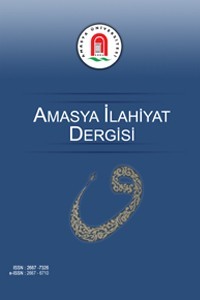Prof. Dr. Hüseyin Peker’in “Kur’an Meâli” Adlı Eserindeki Bazı Yorumların Tahlili
Tefsir, Kur’ân Meâli, Mütercim, Hüseyin Peker, Yorum
The Analysis of Some Interpretations in the Book Entitled “Kur'an Meali” Written by Prof. Hüseyin Peker
Commentary, The Meaning of Qur’an, Translator, Hüseyin Peker, Interpretation,
___
- ‘Abdu’l-Bâkî, Muhammed Fuâd. el-Mu‘cemu’l-müfehras li elfâzı’l-Kur’âni’l-Kerîm. Kahire: Dâru’l-Hadîs, 2001.
- Akalın, Şükrü Halûk - Toparlı, Recep - Argunşah, Mustafa - Demir, Nurettin - Gözaydın, Nevzat - Özyetkin, A. Melek - Zülfikar, Hamza - Tezcan Aksu, Belgin - Durkun, Abdullah - Gültekin, Beyza - Okkalı, Burçak - Terzi, Âdem - Mete, Şener - Kaya, Ömer - Tekeli, Safa. “Duyarlılık”. Türkçe Sözlük. 729. Ankara: Türk Dil Kurumu Yayınları, 2011.
- Altuntaş, Halil - Şahin, Muzaffer. Kur’an-ı Kerim Meâli. Ankara: Diyanet İşleri Başkanlığı Yayınları, 2011.
- Askerî, Ebû Hilâl Hasan b. ‘Abdullah b. Sehl. el-Furukü'l-luğaviyye. Thk. Hüsameddin el-Kudsî. Beyrut: Dâru’l-Kütübi'l-‘ilmiyye, ts.
- Atay, Hüseyin - Kutluay, Yaşar. Kur’ân-ı Kerîm ve Türkçe Anlamı (Meâl). Ankara: Diyanet İşleri Başkanlığı Yayınları, 1987.
- Ateş, Süleyman. Kur’ân-ı Kerîm ve Yüce Meâli. İstanbul: Yeni Ufuklar Neşriyat, ts.
- Aydar, Hidayet. Kur’ân-ı Kerîm’in Tercümesi Meselesi. İstanbul: Kur’an Okulu Yayıncılık, 1996.
- Bayraklı, Bayraktar. Yeni Bir Anlayışın Işığında Kur’an Meâli. İstanbul: Bayraklı Yayınları, 2007.
- Bilmen, Ömer Nasuhi. Kur’ân-ı Kerîm ve Türkçe Meâli. Sad. Sadreddin Gümüş - Yakup Çiçek - Muhsin Demirci. İstanbul: İpek Yayınları, 2000.
- Buhârî, Ebû ‘Abdillâh Muhammed b. İsmâîl. el-Câmi‘u’s-sahîh. 8 Cilt. İstanbul: Çağrı Yayınları, 1992.
- Bursevî, İsmail Hakkı. Açıklamalı Kur’ân-ı Kerîm ve Türkçe Meâli. Haz. Nedim Yılmaz. İstanbul: Damla Yayınları, 2001.
- Cerrahoğlu, İsmail. Tefsir Usûlü. Ankara: TDV Yayınları, 2012.
- Cevherî, Ebû Nasr İsmail b. Hammâd. “Vky”. es-Sıhâh fi’l-lüğa ve’l-‘ulûm. 2: 709-710. 2 Cilt. Beyrut: Dâru’l-Hadârati’l-‘Arabiyye, 1974.
- Çakır, Mehmet. Kur’an-ı Kerîm’in Türkçesi. İzmir: y.y., 2010.
- Çantay, Hasan Basri. Kur’ân-ı Hakîm ve Meâl-i Kerîm. 3 Cilt. İstanbul: Milsan Basın Sanayi, 1985.
- Çantay, Hasan Basri. Kur’ân-ı Hakîm ve Meâli Kerîm. Konya: Balıkesir Üniversitesi Vakfı Yayınları, 2014.
- Doğrul, Ömer Rıza. Kur’an-ı Kerim’in Tercüme ve Tefsir-i Şerifi Tanrı Buyruğu. İstanbul: Ahmet Halit Kitabevi, 1947.
- Dumlu, Ömer - Elmalı, Hüseyin. Kur’ân-ı Kerîm’in Türkçe Anlamı (Meâl). İzmir: İzmir İlahiyat Fakültesi Vakfı Yayınları, 2001.
- Esed, Muhammed. Kur’an Mesajı -Meal-Tefsir-. Trc. Cahit Koytak - Ahmet Ertürk. 3 Cilt. İstanbul: İşaret Yayınları, 1999.
- Ezherî, Ebû Mansûr Muhammed b. Ahmed. “Vky”. Tehzîbu’l-lüğa. 4: 3940-3941. 4 Cilt. Beyrut: Dâru’l-Ma‘rife, 2001.
- Feyizli, Hasan Tahsin. Feyzü’l-Furkân Kur’ân-ı Kerîm Meali. İstanbul: Server İletişim Yayınları, 2006.
- Harman, Ömer Faruk. “Hâbil ve Kâbil”. Türkiye Diyanet Vakfı İslam Ansiklopedisi. 14: 376-378. Ankara: TDV Yayınları, 1996.
- Isfahânî, Ebu’l-Kâsım Huseyin b. Muhammed Râğıb. “Vky”. el-Müfradât fî ğarîbi’l-Kur’ân. 530-531. Beyrut: Dâru’l-Ma‘rife, ts.
- İbn Fâris, Ebu’l-Huseyn Ahmed b. Zekeriyye. “Drb”. Mücmelü’l-lüğa. 2: 577. 4 Cilt. Beyrut: Müessesetü’r-risâle, 1986.
- İbn Manzûr, Ebu’l-Fadl Cemalüddîn Muhammed b. Mükerrem el-İfrîkî el-Mısrî. “Evl”. Lisânü’l-‘Arab. 1: 193-198. 15 Cilt. Beyrut: Dâr Sâdır, 2003.
- Kara, Mustafa. “Kur’ân Kıssalarında Konu ve Kapsam Merkezli Bir Analiz”. İslâmî İlimler Dergisi 9/1 (2014): 69-102.
- Kara, Mustafa. Güncel Değeri Açısından Kur’ân Kıssaları. Samsun: Selamet Yayınları, 2011.
- Karaman, Hayrettin - Çağrıcı, Mustafa - Dönmez, İbrahim Kafi - Gümüş, Sadrettin. Kur’ân-ı Kerîm ve Açıklamalı Meâli. Ankara: TDV Yayınları, 2012.
- Kırca, Celal - Atik, Kemal - Toksarı, Ali - Polat, Selahattin - Bardakoğlu, Ali. İslâmi Kavramlar. Ankara: Sema Yazar Gençlik Vakfı Yayınları, 1997.
- Koçyiğit, Talat. Kur’ân-ı Kerîm ve Türkçe Meâli. Ankara: Kılıç Kitabevi, 1997.
- Müslim, Ebu’l-Huseyn Müslim b. Haccâc. el-Câmi‘u’s-sahîh. 8 Cilt. İstanbul: Çağrı Yayınları, 1992.
- Neccâr, Abdulvehhâb. Kısasu’l-enbiyâ. Beyrut: Dâru İhyâi’t-Türâsi’l-‘Arabî, ts.
- Öztürk, Mustafa. “Kur’ân, Kitâb-ı Mukaddes ve Sümer Mitolojisinde Hâbil-Kâbil Kıssası”. Çukurova Üniversitesi İlahiyat Fakültesi Dergisi 4/1 (2004): 147-164.
- Öztürk, Mustafa. Kur’an-ı Kerim Meali -Anlam ve Yorum Merkezli Çeviri-. Ankara: Ankara Okulu Yayınları, 2015.
- Öztürk, Mustafa. Kur’an-ı Kerim Meali -Anlam ve Yorum Merkezli Çeviri-. Ankara: Otto Yayınları, 2008.
- Peker, Hüseyin. Kur’an Meâli -Sade ve Akıcı Bir Üslup-. Ankara: Gece Kitaplığı Yayınları, 2015.
- Sadak, Bekir. Kur’ân-ı Kerim ve Türkçe Anlatımı. İstanbul: Marmara Üniversitesi İlahiyat Fakültesi Yayınları, 2009.
- Serahsî, Ebû Bekr Şemsü’l-Eimme Muhammed b. Ebî Sehl Ahmed. el-Mebsût. 30 Cilt. İstanbul: Çağrı Yayınları, 1983.
- Yavuz, Yusuf Şevki. “Elmalılı Muhammed Hamdi”. Türkiye Diyanet Vakfı İslam Ansiklopedisi. 11: 57-62. Ankara: TDV Yayınları, 1995.
- Yazıcı, Gülgün. “Hasan Basri Çantay’dan Yaşar Nuri Öztürk’e Kur’ân Meâllerinde Türkçenin Serüveni”. Kur’ân Meâlleri Sempozyumu -Eleştiriler ve Öneriler-. 2: 383-395. Ankara: Diyanet İşleri Başkanlığı Yayınları, 2007.
- Yazır, Elmalılı Muhammed Hamdi. Hak Dini Kur’ân Dili. 10 Cilt. İstanbul: Eser Kitabevi, 1935.
- Yazır, Elmalılı Muhammed Hamdi. Kur’ân-ı Kerîm ve Türkçe Meâli. Sad. Yakup Çiçek - Necat Kahraman. İstanbul: Temel Neşriyat, 2000.
- ISSN: 2667-7326
- Yayın Aralığı: Yılda 2 Sayı
- Başlangıç: 2013
- Yayıncı: Amasya Üniversitesi
İlahiyat ve Fen Bilgisi Öğretmenliği Öğrencilerinin Işık Kavramı Hakkındaki Metaforik Algıları
Salih DEĞİRMENCİ, Sevilay KARAMUSTAFAOĞLU, Orhan KARAMUSTAFAOĞLU
Prof. Dr. Hüseyin Peker’in “Kur’an Meâli” Adlı Eserindeki Bazı Yorumların Tahlili
Kilise, Mistisizm ve Feodalite Perspektifinden Orta Çağlı Bir Hıristiyan Mistik: Bingenli Hildegard
Kur’âniyyûn Akımının Mısırlı Bir Mümessili: Muhammed Ebu Zeyd (H.1349/M.1930) Örneği
Kur’ân’da Cehennem Kavramının Tefsîr Müdevvenatına Yansıması Üzerine Genel Bir Değerlendirme
Câhiliye Dönemi Şairlerinden El-Efveh El-Evdî'de Fahr Teması
İslam Ceza Hukukunda Celde Cezasının İnfazında Kullanılacak Alet ve Uygulanışı Üzerine Bir İnceleme
Adaylık Eğitimi Alan Öğretmenlerin Değer Öğretimi Etkinlikleri Hakkındaki Görüşleri
Câhiliye Dönemi Şairlerinden El-Efveh El-Evdî'de Fahr Teması
